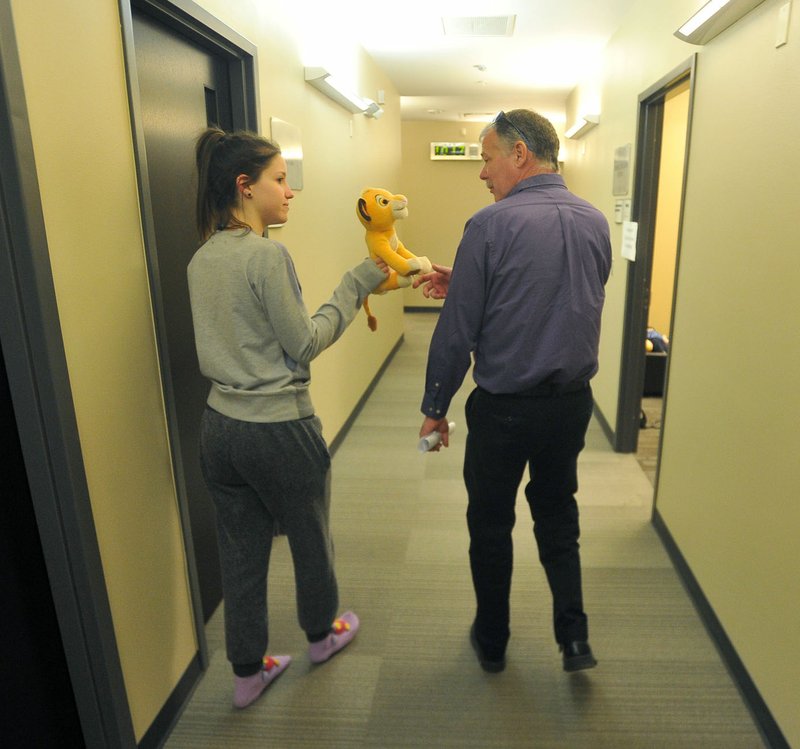BENTONVILLE -- She wore a green shirt and black tights. Pink angel wings sat on her back while a tiara snuggled in her hair.
The faux 5-year-old sat and waited until an adult approached her. She asked why he wanted to speak with her, then she followed him into an interview room.
The encounter was the first stage in an exercise where professionals involved in child-abuse investigations had to interview adults portraying children and suspected victims. The training occurred last week in the Melba Shewmaker Southern Region National Child Protection Training Center at Northwest Arkansas Community College.
The "child" actually was Jordan Anglin, 28. Anglin wore the angel wings and tiara to stay in character. She also sounded like a small child.
"Without the actors, we couldn't have the training," said Rita Farrell, director of education at the center. "The actors really make the difference."
Anglin has been an actor in training sessions for the past four years. She and the other adult actors help train professionals who work with and aid children in child-abuse investigations.
"Our kids need a voice, and someone that they can especially trust," Anglin said.
Matt Scott, 34, played the character of a 6-year-boy who was a victim of child abuse. Scott has acted in training exercises for five years. The interviews could be useful evidence in court and could help validate a child's claims, he said.
The trained actors allow students to test their interviewing skills, Farrell said.
Jack Hailey, a detective with the Paragould Police Department, got his chance Friday morning. He had to interview an actor portraying 7-year-old Susan, who held a stuffed animal close to her.
Hailey introduced himself to the adult actor who was portraying the little girl.
"My job is to listen to you," Hailey told her.
Hailey described the training as demanding but also called it an "educational experience."
"I've watched a lot of interviews, but I now have a better understanding of why the interviewer asked certain questions," he said.
The training would be helpful for anyone involved in child-abuse investigations, he said.
The interviewing exercise was part of a weeklong course called Child First that included interview training for the 41 students, Farrell said.
The students are police officers, Arkansas Department of Human Services workers, medical and mental health professionals, prosecutors and others who work with child advocacy centers and the Arkansas State Police Crimes Against Children unit. Farrell said the 41 students came from 11 counties across the state.
The center trained 5,864 students last year, Farrell said. Dozens of different students will be trained at another program at the center in a few weeks.
The Arkansas Commission on Child Abuse, Rape and Domestic Violence pays for the participants to attend the 40-hour course, Farrell said.
Paul Carter, a detective with the Benton County sheriff's office, acted as an interviewer Thursday.
"I saw the other side of it," Carter said. "I saw it from the eyes of a child, and now I better understand why sometimes they are not willing to say anything about the abuse."
Carter said the acting was difficult, and he was uncomfortable with the interview. His team critiqued his work, pointing out good and bad things that happened during the interview.
The training, especially the interviewing, allows students to make mistakes in a mock setting instead of a real-life situation, Farrell said.
"It just provides hands-on experience for what they will be facing," Farrell said.
Metro on 03/21/2016
